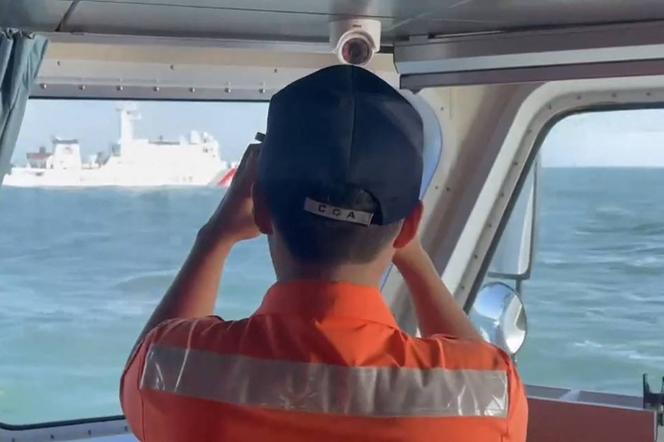


Whenever Captain Wu goes out to sea, his gaze constantly alternates between the horizon and the GPS screen. The fisherman, who wears oval glasses and a cap, has to keep an eye out for the cargo ships that criss-cross the Taiwan Strait or enter the port of Xiamen, a large Chinese city close to Taiwan's small Kinmen archipelago, where he was born and still lives.
However, the main danger for Wu is not so much the dense maritime traffic as the red line that appears around Kinmen and its adjacent islets on his geolocation screen. The delineation of what Taiwan calls its "restricted waters," the territorial waters around Kinmen, is now at the heart of cross-strait tensions. No sooner had he set course to the west, leaving behind the seawall of Kinmen port, did the Taiwanese coastguard, who had greeted him on the pier a few minutes earlier, radio a warning to be careful: this line must not be crossed.
About one nautical mile ahead of him, a huge container ship belonging to the Hong Kong shipowner OOCL passed, then, in the opposite direction, a ferry belonging to the Chinese shipping giant Cosco, owner of OOCL. The 56-year-old looked up again: this time, he saw a long white boat, which he pointed to. "It's one of their ships, the fast-moving one. They're watching us as we approach the line." Using binoculars, he confirmed the inscription "China Coast Guard" on the patrol boat's hull and its emblematic blue and red lines. "What's worrying is that we no longer know the boundaries between them and us," confided the fisherman.
In the waters of the Taiwan Strait, the situation has become tense in the run-up to the inauguration of Taiwan's new president Lai Ching-te, reviled by China, on Monday, May 20. On the front line are the fishermen of Kinmen. The island, with its 128,000 inhabitants, is less than four kilometers from mainland China, but 187 kilometers from the main island of Taiwan, which governs it.
The area where Captain Wu, who wished to use a pseudonym, sails reflects the political tension in the region. Watchtowers, bunkers and anti-landing spikes can be seen on the islets his ship crosses, as well as soldiers on standby. A large rock is topped by a giant concrete loudspeaker, which has long broadcast a song by Taiwanese singer Teresa Teng to charm the citizens of Communist China. Captain Wu, on the other hand, is more interested in the fish in the shallow waters nearby. He has nothing against the Chinese, who are so close, and is impressed by their skyscrapers. In the past, he has shared meals at sea with Chinese fishermen, but relations between Beijing and Taipei, which have deteriorated considerably, complicate everything. One incident in particular, in late winter, rekindled tensions and continues to be exploited.
You have 61.44% of this article left to read. The rest is for subscribers only.
